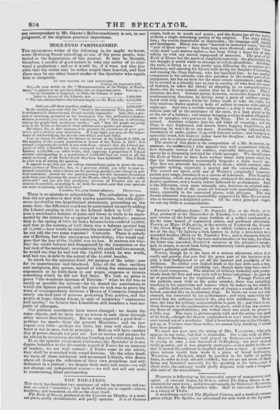MOLE-EYED rARTISANSHIP.
THE anonymous writer of the following is, for aught we know, some Downing Street underling, or one of the press people, interested in the depreciation of this journal. It may be thought, therefore, a stretch of good-nature to take any notice of so equivocal a production : and so it would be, if it were not also possible that the writer may be rather stupid than knavish, and that there may be one other honest reader of the Spectator who equals him in incapacity.
TO THE EDITOR OF THE SPECTATOR.
London, 4th September 1837. SIR—In your article on the "Misrepresentation of the People in Podia. taent," it appears to me you have fallen into an important error. You say" On the Counties in England, in 1835, the balance of popu lation in favour of the Liberals, was 1,804,000 " The late election throws the balance largely on the Tory side, 4,132,000 And you add these together, making 5,936,000" In the context, you state that the "result is the enormous Tory gain, which is arithmetically demonstrated, though morally impossible." And, after a process of reasoning, grounded on the assumption that this arithmetical demonstration is correct, you arrive at the conclusion, that " Toryism is advancing among the people with prodigious strides ; " aud " that the people are going over to the Tories at the rate of three millions anti a quarter per annum." My object, Sir, at this moment, is to question the correctness of your premises, and d fortiori your conclusion. If I am right, you may see the importance of acknowledging the mistake into which you have fallen. I see no reason for adding the balance in favour of the Liberals in 1833, to the majority of the county population in favour of the Tories in 1837: it is enough (supposing the results as you state them, correct) that the Liberal majority of 1833. 1,804,000, has been swamped and comprehended in the Tory balance, 4,132,000,—in other words, that supposing a proportion of Liberal electors corresponding to a population of 1,804,000 had not voted at all, the result in favour of the Tories would then have been 2,348,000. This 1 think is a fair way of stating the question. It appears to me that you are taking extraordinary pains to prove the wondrous increase of Toryism ; but, in a previous article, you refer to your increased circulation, since (excuse me for speaking plainly) your change in political sentiment : answer me one question,—may not this increased circulation arise from your deserting the cause of the People, which you formerly so nobly advocated? and has not that prodigious increase of Toryism you are so anxious to establish, something to do with the matter, now that your opinions are more in harmony with their own? I remain, Sir, your former admirer, DETECTOR.
There is no mistake to acknowledge. The calculation in question did not profess to deal with known quantities, but with differences involved in two hypothetical statements, proceeding on the same data : the difference could not be ascertained except by adding the Liberal surplus in 1535 to the Liberal deficit in 1837. Suppose a merchant's balance of gains and losses in trade to be represented by the balance for or against him at his banker's: suppose that in the spring of 1833 he had a balance to his credit of 18,000/. and that in the autumn of 1837 there was a balance against him of 4.5,000l.—how would he calculate the amount of his loss? would he not add the two sums together? Certainly. There is nobody out of Bedlam, but this anonymous letter-writer, who would suppose that the loss of the 18,000/. was no loss. It matters not whether the credit balance had disappeared by the inattention or the bad luck of the merchant: on examining his profit and loss account, he would see that he had lost the 18,000/. which he was worth, and had run in debt to the extent of the 45,0001. besides.
So much for the apparent bonii fide purpose of the letter : now for its impertinence and falsehood. Like all the other cavillers and maligners, this person, instead of taking the statements and arguments as he finds them in our pages, supposes or invents something which he did not find there. We took no pains to prove "the wondrous increase of Toryism : " what we did was as nearly as possible the reverse—for we denied the conclusions to which the figures pointed, and the pains we took was to prove the 'want of correspondence between a House of Commons composed nearly one-half part of persons professing Tory politics, and the people at large, among whom, in spite of temporary "supineness and apathy," we believe that Liberalism still numbers a vast majority of adherents.
Oar political sentiments have never changed : we desire the same objects, and we have seen no reason to seek them through other means than formerly. But we once expected a good deal—
perhaps too much—from the present Ministers ; and we now expect very little—perhaps too little, but time will show. Our trust is not in men, but in principles. Reform will have another
day of power, though not just yet. Let us hasten and prepare for its advent by eschewing mystify big humbug and cultivating truth. If, as the spiteful anonymous insinuates, the Spectator is in any degree beholden to the favourable regard of Tories for an increase
of readers, we are well content : it Tories come to our school, they shall be nourished with sound doctrine. On the other hand, we warn off those intolerant and misnamed Liberals, who desire
above all things the reflection of their own prejudices and selfdelusions in a journal : we despise their rants and cants—we will not change our independent course—we will not sell our souls to unreasoning, blind partisanship.


























 Previous page
Previous page